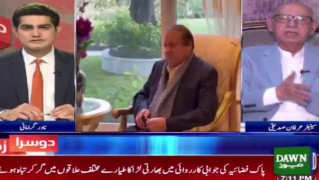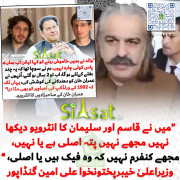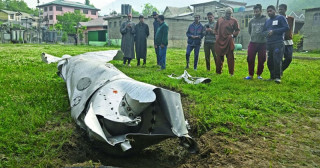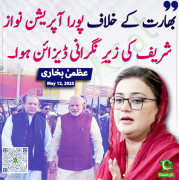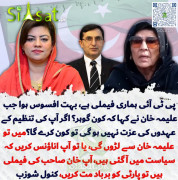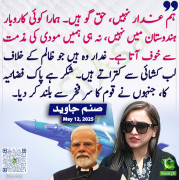اگر حکمت کسی اور طریقے سے منتقل ہوئی ہے تو بتاؤ
قرآن چودہ سو سال اور حدیث بارہ سو سال سے موجود ہے. ٹیکنالوجی نے اس تک رسائی آسان بنا دی ہے. ساتھ میں ہر شیدے میدے کو عقلمند بننے کا موقع بھی فراہم کر دیا ہے
Mujhay nahi lagta kay tum sheeday meeday ho. Chalo mujhay thori see ahadith key history bata dou kay kiya yeah ahadith authentic hain kab aur kaysay ahadith jama key aur kiya Quran samjhnay kay liyay ahadith ka hona zaroori hay?
NABI PE USS NE FAQAT IK KITAB UTARI HAE
KHUDA KE DEEN MEIN SHAMIL KAHAN BUKHARI HAE
QUR'AN KE ASAR KO TOR DENAY KE LIYE
HUM LOGON PER RAAVION KA LASHKAR TOOTA
Hikmah ko samjhanya kay liyay yeah article parhlo khulay zehan say tu shayad samajh aa jaay.
The proponents of Hadith are no different. They now come back and site the following Ayah to suggest that Allah revealed at least two different revelations to the Prophet Muhammad, one being the Book <al-Kitaab>, and the other being the Wisdom <al-Hikma>:
“…For Allah has sent down <anzala> to you the Book and the Wisdom and taught you what you knew not…” (4:113)
We will see that just like al-Dhikr (The Reminder), al-Hikma (The Wisdom) is also an attribute of the Qur’an. The Qur’an is not just a Book of laws and regulations. It also contains the Wisdom behind those laws and regulations. Thus when Allah says “Book and Wisdom”, He is emphasizing that it is a “written record” that contains “the wisdom” behind the written statements.
We will now look at the Qur’an to establish the meaning of “Al-Hikma”. As we have established before that the delivery or “Balagha” of the Messenger is the Qur’an, we start with the Ayah that relates the Balagha to the Hikma:
“There has already come to them recitals wherein there is (enough) to check; delivery of Wisdom <Hikmatun Balighatun> - but the preaching of warners profits them not.” (54:4-5)
Here the delivery <Balagha> is that of Hikma. As we have seen above that the delivery is from the Book of Allah. Therefore, this Ayah establishes that Hikma is from the Book and not outside.
Then in the following Ayah, Allah establishes that The Qur’an is the Hikma:
“These are of the Wisdom <al-Hikmati>, which your Lord has revealed to you. Take not, with Allah, another object of Worship, lest you should be thrown into hell, blameworthy and rejected” (17:39).
This Ayah clearly establishes that part of the Hikma revealed to the Messenger is that he “Take not, with Allah, another object of Worship, lest you should be thrown into hell, blameworthy and rejected”, which is part of the Qur’an.
Then,
“This is what We rehearse <natluhu> to you of the Ayaat and the Reminder of Wisdom <al-Dhikr al-Hakeem>” (3:58)
Note here that Allah ties Wisdom to the Dhikr, which we have already established to be the Qur’an. It is also important to note that the “Reminder of Wisdom” is to be recited <Natluhu>. The only thing that the Muslims recite is the Qur’an. No one ever recites Hadith. Thus the Hikma is just another attribute of the Qur’an.
Also interesting to note is that the teaching of the Messenger of the Book and the Wisdom is always tied to him reciting the Ayaat of the Qur’an; see for example:
“Allah did confer a great favor on the believers when He sent among them a Messenger from among themselves, reciting <Yatlu> to them the Ayaat of Allah, purifying them, and teaching them the Book and the Wisdom, while before that they were in manifest error” (3:164)
Allah further says that He ONLY instructs us to RECITE <Yutla> His Book and NOTHING ELSE:
“And is it NOT ENOUGH for them that We have sent down <Anzalna> to you the Book, which is Recited <Yutla> to them? Verily, in it is Mercy and Reminder <Dhikr> to those who believe” (29:51)
Allah leaves no doubt that it is the Book that He wants us to Recite. Again notice that everything outside of the Book is excluded by this Ayah. Thus if Hikma or Dhikr were “other revelations” outside of the Book then this Ayah excludes them.
Note here again in 29:51 that what is sent down <Anzalna> is of the Book only (and that is enough), which further confirms that Hikma is included in the Book.
We now look at other evidence that al-Hikma is something that is to be recited. We see that Allah commanded the wives of the Messenger to recite al-Hikmah:
Wazakurna ma_ yutla_ fi buyu_tikun na min a_ya_til la_hi wal hikmah inal la_ha ka_na latifan khabira
"And bear in mind that which is recited in your houses of the revelations of Allah and wisdom <al-Hikma>. Lo! Allah is Subtile, Aware." (33:34)
This verse, along with the above evidence leaves no doubt that Hikmah was to be recited, and that it is just another attribute of the Qur’an. However, some people say that “Yutla” does not necessarily mean “to recite” but could also mean “to read from memory”. They insist that in this Ayah, the Hadith of the Prophet are included and his wives are instructed to read the verses of the Qur’an as well as the Hadith of the Prophet. This claim is not only baseless but quite funny. First of all, the Qur’an uses the words “Tilawa”, “yatlu”, “Tatlu” , etc. explicitly for RECITATION of the VERSES of the Qur’an. In addition, reading the Hadith for the wives would create a very comical situation. It would be interesting for the wives of the Prophet to be reciting that “The Messenger stood up by a wall and urinated”, that “The Messenger had sex with 9 women in one night”, and that “Messenger poked out the eyes of some people and cut their hands and feet and put them up on the wall to die”, and that “Messenger told us not to write the Hadith but we are writing it anyway” (please see these Hadith in the Appendix). I hope the proponents of Hadith see the ridiculousness of their concocted “explanation”.
Allah clearly explains to us that Wisdom is an attribute of the Qur’an:
“Alif Laam Ra. These are the Verses of the Book of Wisdom <Kitaab al-Hakeem>” (10:1)
“Alif Lam Mim. These are the Verses of the Book of Wisdom” (31:1-2)
“Ta Sin. By the Qur’an full of Wisdom” (36:1-2)
“We have made it a Qur’an in Arabic, so that you may use your Aqal. And verily it is in the Mother of The Book, in Our Presence, High, Full of Wisdom” (43:3-4)
These above Ayaat make it evident that Wisdom is an attribute of the Qur’an. Thus when the Qur’an is revealed to the Prophet, its Hikma is also revealed to him by default.
However, some people still insist WITHOUT PROOF that Hikma is a separate revelation from the Qur’an. Allah disposes of such claims when He tells us:
“Ha Mim. And the Book of Clarity <Kitaab al-Mubeen>. We sent it down during a blessed night: for We wish to warn. In that is made distinct EVERY affair of WISDOM” (44:1-4)
Here Allah ties the descending of the Book with all wisdom.
There is abundant evidence that Hikma is an attribute of the Qur’an, and is to be Recited. Qur’an is not just a “Kitaab” or “Book” of Legal rulings. It also contains the Wisdom behind those rulings and laws. Thus “The Book and the Wisdom” means the laws and the wisdom behind those laws. This is the Miracle of Allah’s Revelations – they contain His laws as well as the Wisdom behind those laws.
“But their hearts are in confused ignorance of this, and there are, besides that, deeds of theirs, which they will (continue) to do – until, when We seize in punishment those of them who received the good things of this world, behold they will groan in supplication. It will be said: ‘groan not in supplication this day, for you shall certainly not be helped by Us. My Ayaat used to be Recited <Tutla> to you, but you used to turn back on your heels in arrogance talking nonsense about it, like one telling fables by night. Do they not ponder over the Word, or has anything come to them that did not come to their fathers of old?” (23:63-68)
“But there are, among humans, who purchase idle Hadith, without knowledge, to mislead from the path of Allah and throw ridicule: for such there will be a humiliating penalty. When Our Ayaat are Recited <Tutla> to such a one, he turns away in arrogance, as if he heard them not, as if there were deafness in both his ears: announce to him a grievous penalty” (31:6-7)


